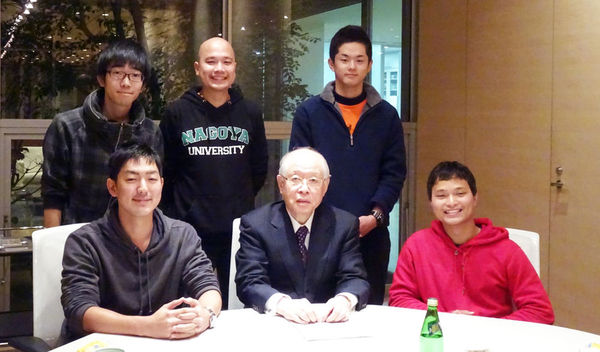Since January 2013, University Prof. Ryoji Noyori, a Nobel Laureate in Chemistry (2001), has contributed numerous articles to "Kamitsubute" in Chunichi Shimbun. Based on these articles, he holds regular academic discussions with students at Nagoya University. At the Eighteenth Noyori Academy Salon, held on November 27, 2015, Prof. Noyori and four students from different academic fields at Nagoya University discussed the topic "Science and Technology for Innovation." In Kamitsubute, Prof. Noyori emphasized that a zest for life will be won through fruitful discussions to broaden horizons.

Pham Vu Loc, from Vietnam, a visiting research scholar at the Graduate School of Engineering
What social infrastructure is required for innovation?
Prof. Noyori
I want to cite the example of how young people in Silicon Valley have been creating new businesses. The most important things are a vision and ideas. Generating such business ventures makes innovation successful. On the other hand, in Germany, collaborations between industries and academia have progressed well. Researchers from various industries are also teaching at universities.
Japanese industries have pioneered in innovation, despite the current difficult economic situation that hampers the motivation to start new things. In particular, university professors work in narrow worlds with dull business trends. I suggest that there must be human resource intervention between industries and universities.
Sam Shih-Cheng Chien, from Taiwan, a third year PhD student at the Graduate School of Science
Which is the most important role for universities, research or education?
Prof. Noyori
The general public expects both good research and education. Regardless of the subjects, young researchers should be trained at universities to build a vigorous society. Universities should seriously fulfil public expectation.
In fact, my concern is that the assessment criteria are set up by the number of research articles and citations. Science can be objective, whereas its assessment is subjective. Therefore, it is impossible to evaluate the essentials of research achievements by those figures.
Katsushi Kobayashi, a first-year student at the Graduate School of Bioagricultural Sciences
What should students’ mentality be?
Prof. Noyori
In research activities, it is important to not only have intelligence but also to have a sense of uniqueness. Dr. Kajita, a Nobel laureate in Physics (2015) expected his research to establish a cultural property. He provided our views of life with ideas like human beings are tiny and therefore must appreciate everything and live modestly. By reading many books on big data and accumulating knowledge, you cannot obtain a zest for life. What you need is to have great discussions with people from diverse backgrounds.
Takuya Nagura, a junior at the School of Engineering
I have decided to work in the laboratory when I am a graduate student, prior to working in a corporate.
Prof. Noyori
I am worried that your expectation is only oriented to Nagoya University. In general, students from many countries are challenging themselves to study in different universities for their next step. You have had many opportunities to study in the USA, the UK, China, etc. I expect that you will also look around outside. Although scholarships for graduate students are not entirely provided in Japan, there are various scholarships available overseas that also includes living expenses. To be open to innovation, one must have a wide vision.
Original article published in Chunichi Shimbun on November 28, 2015.